- Learning time
- 40 minutes
- First play time
- 120 minutes
Gùgōng
Designed by: Andreas Steding
In 1870 China, the Longqing Emperor tries to eradicate corruption by outlawing bribes. Corrupt officials – that’s you – overcome this ruling by giving gifts instead. It’s fine to give gifts, isn’t it? Even if one is a priceless vase, and the other a bowl of lemons…
Over the course of Gùgōng’s four rounds, your role is to make sure that you shrewdly deal your way into the Emperor’s good graces by having the most points at the end of the game. You gain points by travelling the land, contributing to the building of the Great Wall, issuing decrees, and gathering jade with which to presumably gift him when you’re finally in his presence. But how you go about all this is the crux of Gùgōng, because the exchange of gifts is the currency of the game.
The board shows seven spots where gift cards may be given and received. In order to activate both the reward of the spot and the card itself (if it has one; not all do) the gift you give – ie, play to the board – must be of a higher value than the one you take away. Assuming that’s what you do, you can move your traveller along the paths of the country, gaining rewards for where they stop. You can collect jade at the jade house (points at the end of the game), issue decrees (in-game benefits and points), build the Great Wall (points for contributing the most), travel the Great Canal (gain rewards for bringing a fully-crewed boat to harbour) and indeed, make your stately progress through the Palace of Heavenly Purity in order to see the Emperor himself. Although this last option is possibly the least alluring, it’s the most important – if you haven’t reached the top of the palace track by the time the game ends, you can’t win – it doesn’t matter how many points you’ve scored!
Functioning alongside the gift cards are servants to do your bidding. You start the game with four, and they can be spent in three main ways – in order to boost a particular action on the board; in order to allow you to play a lower card than the one you’re replacing (cost: two servants!) and to help crew the boats and build the walls. It’s very likely you’ll frequently find yourself needing more servants than you currently have, and managing this inevitable shortfall is part of Gùgōng’s challenge.
Around this central idea of gift-exchange are a number of smaller things we won’t list in too much detail here: an intrigue track that is used to decide turn order as well as ‘cash in’ your progress for rewards, a ‘double servant’ that can juice things up for you on the board, along with the numerous decrees that can give you benefits and rewards… but cost you precious servants in order to do so. There are also the not-strictly-thematic destiny dice: in every round collecting matching gift cards triggers a points reward and extra servants, so it’s definitely worth bearing them in mind.
After the fourth round, the Great Wall is scored again, points are scored for decrees and jade, and the player furthest along the track is the most deviously corrupt official of the Ming Dynasty. Congratulations…?
The guru's verdict
-
Take That!
Take That!
A little around the edges. The predominant mechanics of the game are non-interactive, but there are two or three places where things overlap.
-
Fidget Factor!
Fidget Factor!
Once you're up and running, the seeming plethora of options reduce: your cards and servants tend to dictate what you can do, although there's certainly the possibility that lulls may occur, because you only play 16 or so gift cards in the entire game - each decision is crucial.
-
Brain Burn!
Brain Burn!
Play a card, take the action. Take the action on the card. The buttons to push are simple. Where it gets complicated is joining everything up so the sum total of your decisions have the right overall result!
-
Again Again!
Again Again!
Gugong has a very moreish quality - each action is seductive in its own way, and the presentation is - once you get used to the iconography - all rather lush. But what makes it a very replayable game is how the simple sixteen actions can unfold in very different ways: do you go for a particular strategy, or a more tactical and reactive approach? Some of it - the destiny dice! - does feel a little incongruous, but once you're past that awkward first play the game moves exceedingly fast.

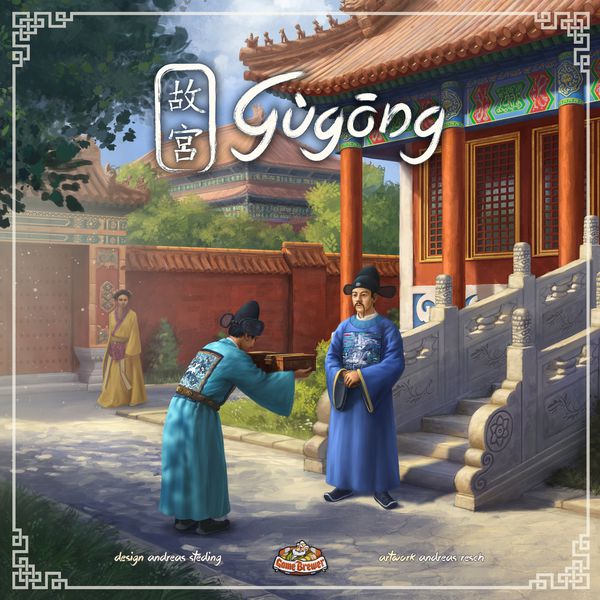

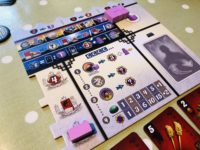
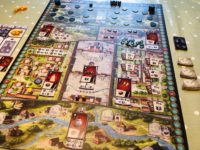






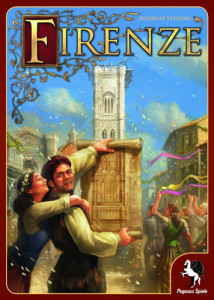

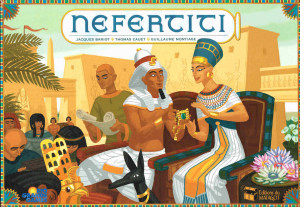

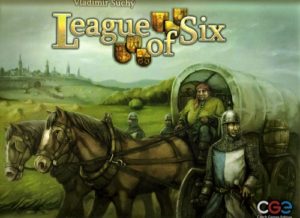

Sam says
I really appreciate the cleverness of a game that loads so much import onto everything you do. It reminds me of Underwater Cities, but Gùgōng plays a lot quicker and is probably less forgiving in terms of 'wasting' a turn in order to get your ducks in a row for a subsequent round. If the conceit of do X to score points doesn't feel all that fresh, what Gùgōng does bring to the table is the really engaging gifting system, making it far more interactive than it first appears: you have to consider what you're picking up, and what opportunities you're leaving behind. There's a number of deft touches we haven't gone into here, but suffice to say for a game where you are very likely to have a maximum of 16 decisions, it makes every one of them deliciously vital.